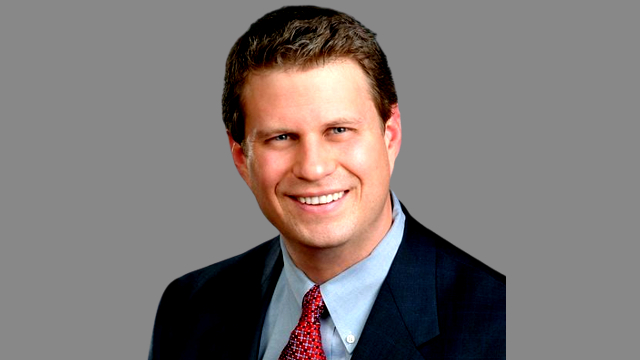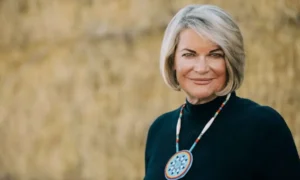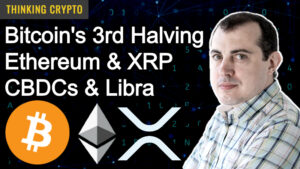Here is my interview with Congressman Bill Huizenga. In this interview we talk about how the US can get crypto right with proper regulations, how the Congressman and his constituents will hold the SEC and Gary Gensler accountable, meeting Sam Bankman-Fried and the FTX collapse, will Congress investigate the Bill Hinman Ethereum ethics violation, CBDCs and the Digital Dollar.
Transcription
- Welcome back to The Thinking Crypto podcast. With me today is Congressman Bill Huizenga. Congressman, it’s great to have you on the show.
- Hey, thanks for having me. I appreciate it, Tony.
- Congressman, there’s lots to talk about as it relates to crypto, but before we get there, I would love to get to know you a bit better. Where are you from? Where’d you grow up?
- So, yeah, I grew up in Michigan and you can always tell Michiganders ’cause we walk around like this, pointing at our hand where we’re from. So Detroit’s down here, Chicago’s down over here, this is Lake Michigan. You gotta get technical. Here’s the upper peninsula as well. But I grew up over on that west side of the state about midway up the palm and it’s a couple of great areas, small towns, Holt and Zeeland, and it is very unique, it’s very entrepreneurial, forward thinking. We’re home to the three largest office furniture makers in the world so I’m always curious when I’m on with a screen like this, I’m trying to figure out who made your chair that you’re sitting in. I’m sitting in an Aeron chair, so if anybody listens is an Aeron fan, that’s made in my hometown of Zeeland, so that’s where I grew up.
- That’s awesome. And how did you get into politics? You know, was it something you dreamed of growing up or were you looking at some, another career?
- Yeah, my dad was involved in city politics. He was on the city council for over 30 years. To be honest, I was gonna outdo my dad. He was the vice mayor of the town of 6,000, and I wanted to be mayor at some point. I wanted to see if I could one up dad and become mayor of our little 6,000 person town. Turns out I never became mayor, but I did serve as the state representative for the area and then now, obviously, in this position. But, you know, interestingly enough, like a lot of families, my family had diverse political opinions. My mom grew up on the other side of the state in Flint, Michigan,
- Oh.
- And very traditional Irish Catholic family. My grandfather was part of the first original sit down strikes that helped create the United United Auto workers, the UAW, and dad was a good Dutch Protestant who was very entrepreneurial, kind of not rough or anything, but just kind of serious-minded on those things. So the Irish side of the family was way more fun. The weddings, everything was a lot more fun than that Dutch side. But the upshot was is they didn’t always agree politically.
- Sure.
- And my earliest political memory is, and I was pretty young, I remember my dad and my mom, and my mom had been married before, so I have an older half-brother and sister, and they were in high school and this was in the early ’70s and they were arguing about something, some place called Vietnam.
- Hmm.
- Some thing called a Watergate. And some guy who my dad knew who had just become president of the United States, Gerald Ford, because Gerald Ford represented our area in Congress for a period of time.
- Right.
- And I remember pounding on the table and going, what is a Watergate? ‘Cause I couldn’t figure out my little head what some sort of sluice out in the field. That was when my family figured out I was kind of a weird kid. I was paying attention. But, for whatever reason I was just created this way. I’ve always found it interesting. I like learning. I like learning something new and different. I like people. But I also like trying to figure out solutions, and understanding an issue, dissecting an issue, and then trying to figure out what that’s gonna turn into. When I graduated I ended up getting a degree in political science, but my family’s in construction and I always had a fascination with real estate as well. And so when I graduated I got into real estate full-time and my family has done a little housing development, development type stuff and condominiums, nothing too major, but it was always an area of interest. So I was able to do that and yet volunteer for a lot of the political, local political races, and that kind of thing.
- Hmm.
- So was doing that was happy with my life. I was gonna be a partner at the real estate firm that I was in. I always kind of thought maybe I would try elective politics later in life after I had established myself and had a family and hopefully made a little money and viewed that more as of a retirement thing. And my predecessor came knocking asking if I would join him as his district director. So it meaning I could stay in Michigan and I was gonna do that for only two years. I was gonna transition him, get him through the next election. Two years turned into six. I loved it. I just knew I wasn’t done with it. I had the opportunity then run for the state legislature. In Michigan it’s pretty much a full-time job. You represent about 75,000, I’m sorry, 95,000 people or so. And ran for speaker of the house in the state of Michigan. Came in second. Was the best thing that could have ever happened to me. You’ll learn way more in life from your losses typically than you do from your wins. And I learned a lot in that process. And then when my predecessor decided to not run again, I threw my hat in the ring for a seven-way primary, which I ended up winning by 664 votes out of almost 103,000 votes that were cast.
- Wow.
- So it was a lot of hard work by everybody in the family, but it’s been very rewarding.
- Oh, that’s amazing. And I love the little nugget there, right? You learned from your failures. And while it may seem that that was something that did not pan out for you at the time, it worked out well. So really great stuff.
- Yeah.
- Let’s talk about crypto and what’s happening in the markets, and you know, maybe instead of getting into FTX and SBF directly, let’s talk about the larger theme. And that is the United States got the internet right and it was well-balanced regulations and that led to economic growth and jobs and so forth. How can we get it right with crypto? Because there seems to be a lot of confusion. Regulators not on the same page, Congress not entirely on the same page. How can we get it right?
- Yeah, I would only amend that Tony, by saying Congress not anywhere near on the same page. All you gotta do is look at the hearing yesterday where you’ve got my chairman of the subcommittee that I’m the lead Republican on, our capital markets subcommittee, Brad Sherman calling for the abolition, abolishment, I should say, the abolishment of crypto. Of all crypto, and a couple of other. Today we had a hearing with the head of the CFPB, the Bureau of Consumer Financial Protection, Rohit Chopra, and a couple of my colleagues were echoing similar themes about that, about consumer protection. And that only really the only way to protect consumers is to not give them that option or choice of being involved in crypto. And I’ve tried to tell a few folks that that’s just not even realistic.
- Right.
- Set aside whether it’s smart or not, it’s just not even realistic. So we’ve got a real issue now. The Republicans on our committee back a number of months ago, earlier as this year, we got together and we kind of hashed out a few things. And you probably have seen this, I know you’ve had Tom Emmer and some other folks on your podcast. The statement that we came out with. sort of this path or pathway, this principle statement was a lot of hard work, you know, and trying to drive consensus. And so while we may not quite have consensus on the Republican side, I think we’re way closer than what we see out of the other side of the aisle, with Brad Sherman saying absolutely ban it, and Ritchie Torres on the other, you know, within the same party, but completely on the different end of the spectrum taking Gary Gensler to task on what he’s been doing. So it’s gonna be difficult, and now add into that, we’ve got a lot of colleagues who are kind of coming up to us, those of us being on the committee and saying, so what’s up with this crypto thing? Not everybody’s at the same education level and I, and trust me, I would not argue that I’m the world’s foremost expert on this. I might be that part of the iceberg that’s sticking up above the water line on my knowledge base versus that deep knowledge that a number of other folks have. But you’ve got some folks who really haven’t had this in their vernacular, in their thought process, and we’ve been wrestling with this, frankly, for years in committee. So it’s gonna be tough. And in that absence or in that vacuum, we’ve seen Gary Gensler assert himself and saying, he’s got all the tools that he needs. Don’t worry your pretty little head Congress, I’ll handle this. Well, that’s not how this works.
- Right.
- And I will on a side note, point out that when he was head of the CFTC, the trade commission, he viewed crypto as a commodity.
- Right.
- Pretty much. And now that he’s head of the Securities and Exchange Commission, voila, crypto is a security and that he believes he should have preeminence in regulating it. And the simple truth is, Tony, Congress, even as difficult as it’s gonna be, we’ve got to be the start of this process here. It cannot just be left up to regulators to make it up outta whole cloth.
- Yeah, absolutely. Congress makes the laws and look, folks are not happy with Gary Gensler and the SEC because there is a lot of confusion, lack of transparency.
- Yeah, yeah.
- And folks in the industry who are building entrepreneurs are waiting for the clarity and for the SEC to get it right. You know, what are your thoughts on the SEC missing FTX, even though Sam Bankman-Fried and FTX officials met with Gary Gensler, they missed Celsius, they missed Voyager and Terra Luna, the loss of billions of dollars, but Kim Kardashian is the highlight of the year? It just seems ridiculous.
- Yeah, yeah. So wait a minute. So we were saved from Kim Kardashian, but we kind of missed SBF.
- Yeah.
- Whoops. That doesn’t make a whole lot of sense. And so I think it actually underscores the point when he’s claiming he’s got all the tools that he needs, clearly he doesn’t, and clearly he didn’t see those red flags that, and we don’t know, we don’t know exactly what his thought process is on this because Tony, this might surprise you and your listeners, but Gary Gensler has not been in front of our committee, the Financial Services Committee, which is the primary oversight committee of his work since October of last year.
- Wow.
- Okay. So it’s been 14 months since we’ve seen him. Interestingly enough, if SBF had actually made the hearing yesterday, he would’ve been there more often than the guy that was supposedly regulating him.
- Right.
- ‘Cause we saw him last December. So, it’s certainly a challenge as we’ve been going into this. You’ve got the AG committee, which traditionally has had commodities under its purview. I would argue that this is a different animal and they may not have sort of the background and the equipment available to them to deal with it the way that financial services is going to, and look, in Washington traditionally, as we’ve been dealing with these issues, we’ve had to just figure out whether they’re fish or fowl.
- Mm-hmm.
- Well, it turns out crypto is more of a platypus. It’s got a lot of the attributes of both and, you know, it’s a mammal laying an egg, you know, and it kind of depends on how it’s applied really as to whether it’s a security or whether it’s a commodity. So, you know, we’re having to work through that. And I understand, Gary Gensler has taught this as a class. He’s had it out on the web. He’s a very smart guy. I am not taking that away at all.
- Right.
- But very smart people sometimes think that they have all of the answers and the only answers. And that’s a recipe for disaster in my opinion.
- So a lot of folks are, and the questions came to me to ask you, how are you and your colleagues at the committee going to keep the SEC and Gary Gensler accountable? What are your plans for 2023?
- Yeah, well, I can guarantee you that it won’t be 14 months between visits.
- Hmm.
- Okay? I mean, that’s part of our primary function here in the House of Representatives is to have oversight. The other is to control the purse strings. Now, the SEC and some of these other regulators have some self-funding mechanisms from fines and different things that they deal with. So we’re gonna have to work through that. But they still come to us with budget requests. We can put things in, called enabling legislation, or limiting language. Enabling, it would would mean, SEC, you must do x. Limiting language would say, SEC, you may not use this money to do y. You can use it for other things, but you can’t do this certain thing. So that’s gonna be the primary tool is looking at the oversight side. There is potential for some legislation. You know, we had been getting close on a stablecoin that Patrick McHenry and Maxine Waters had been working on. And frankly, there was some expectation that we were gonna be dealing with that this calendar year yet before this Congress is out. Just a reminder to everybody, we get seated for a two-year Congress. So when this Congress ends on December 31, all the bills that have been introduced go away. All of the legislation that had been proposed no longer exists and then in January 3 when we get sworn in, we have to start all over again, and that’ll go for that two year period. So there was a lot of work that had been done on it, there was some, I think opportunity and optimism that we might be able to at least start down that path of clarity. And then frankly, FTX happened and, you know, the beginning of November when that all fell apart, it just sucked all the oxygen out of the room.
- Yeah, for sure. And on that note, did you meet with Sam at all? And, what are your thoughts on the collapse, obviously outright fraud?
- Yeah.
- And there’s some that are trying to pin it on the digital assets, the blockchains of cryptos themselves, but this was co-mingling of funds and wire fraud and so forth?
- Yeah.
- And I do wanna, before, I did meet with him and I wanna touch on that, but that is again, part of our challenge, is trying to explain to people what the underlying technology and the blockchain technology, which is going to help not just finances, real estate, medical records, all those things that technology that has enabled crypto is different than crypto.
- Right.
- And they don’t necessarily know that, or see that or understand that. And so that’s been, I felt like that’s been part of my job is to go out and explain to my constituents that this technology is a very valuable technology and we cannot just offload the technology because we had this terrible, bad situation of fraud happen with FTX. So a year ago in December, SBF was coming into the committee along with a couple of other folks because I was the senior person on the subcommittee that has jurisdiction.
- Mm-hmm.
- They requested a meeting, it was gonna be a 30 minute meeting right before, immediately before the hearing that he was going to be in. And he was about 15, 20 minutes late. Came in with his dad actually, and some other staff folks. Now there’s an interesting piece to this because it was part of a question that I asked yesterday and why I bring his dad up. But his dad is a very prominent Stanford law professor, as is his mother.
- Yeah.
- And ironically, tax law is one of the things that they teach.
- The irony.
- And this writes itself. I mean, this is just like, you know, Hollywood, it’s unbelievable.
- Yeah.
- And I found him, frankly, to be very arrogant. Yeah, very sure of himself. Very smart, obviously very, very smart. And subsequently, I’ve heard some stories of people who had interacted with ’em on a regular basis or were they had been courting them to invest into him. Some did, some didn’t. All of ’em pretty much had the same story. And one of the stories that came to me, sort of illustrating this, was when he was asked about whether he had a board of directors or an outside board of advisors, he became very indignant and said you don’t understand how insulting that is to me.
- Wow.
- Well, you know what, guess what, being a math quant is not something everybody can do, but neither is actually running a business and this is a business. And clearly they were not ready for that by any stretch of the imagination. So, how his dad figures in that? One of the sort of unknown unanswered questions is what was the role of his mom and dad? Both of them were highly, highly qualified to be able to work in this space. His dad, who was on a podcast at one point, talking about how they had no legal representation and basically out of necessity he was advising him. So I asked John Ray yesterday about whether there was any evidence of that interaction, you know, Slack messages or whatever, any emails, anything. And he did acknowledge that his dad had been compensated, which had been reported at least, in much of the paper. But that it all ties in because you would think having someone with a professional background and should have a professional opinion about what was happening at this company that he was drawing a paycheck from
- Right.
- Whose son was the majority shareholder of, clearly was reaping benefit from that with the real estate and in the Bahamas and other things. It just sort of builds the case for like, this is more than just someone being asleep at the switch, as the old phrase goes, which is basically what SBF has been saying. You know, “I f’d up.” Well that was, by the way, was gonna be his opening line for his testimony. “I f’d up” Okay, great legal defense.
- Yeah.
- And by the way, massively disrespectful to the whole process of what we’re trying to go through. So, it’s more than that. And that’s what John Ray was indicating. This is just good old-fashioned fraud in his opinion. And I think the evidence is leading in that direction.
- Yeah. I mean some of the things that were happening there just blows me away that they were operating the way they were, and the co-mingling of funds and the insider trading that was happening on Al Matta’s side. And then when they found themselves in a hole from bad trades start taking customer funds to make up for the loss is pretty unbelievable. And they were using QuickBooks for accounting.
- Yeah. Nothing against QuickBooks…
- But,
- But you’re not gonna run a billion dollar multinational with international division and domestic division on QuickBooks. You’re just not, you shouldn’t, but they tried, apparently.
- That’s crazy. Circling back to the SEC, I wanted to ask about how, and maybe you could take us behind the curtain as far as the process. So Congress makes the laws, pass the laws, but how do you get input from the SEC and the CFTC and how is the gap bridged for, is it a subcommittee? Is it your committee?
- Yeah.
- How do we get folks in the same room to say, okay, let’s put together comprehensive regulations that are not draconian?
- So unfortunately we’ve seen more and more of this where the regulators have just been sort of doing this in a silo. They’ve kind of been doing it on their own. Now, there have been times, and just being honest, it is easier when it’s a administration of your own party. There’s a little more philosophical alignment maybe, a little more trust, a few more relationships and we can, for example, request out of the Fed or treasury or SEC or CFTC, we can request technical assistance. In other words, they’re not gonna say, here’s the bill that you ought to introduce, necessarily. But they will take a look at things that we are proposing and that we’re looking at and what needs to be tweaked, and we’ll get that information from practitioners, from think tanks, from sort of outside groups, and also sort of the experience that we have, as we’ll have someone come and say, hey, there’s a problem with X or Y, and we’ll have to start addressing that. To be honest, Tony, the situation I’ve found myself in is the SEC really hasn’t wanted to talk to us. They pretty much think that they’ve got it all handled. You know, there have been just a flood of rules that have been proposed by this SEC It’s in the order of 30 new rules that have been proposed over the last year, a little bit over. And each one of those rules traditionally would take months to sort through, work through, write responses to, and they’ve been having, initially they were having comment periods as short as 60 days to 90 days. And traditionally those have been more like 120 if not longer, you know, at least 90 days, if not 120, if not 150 days. And, that has just been rushed. And so when you, in fact, there was a new rule that one of the commissioners was commenting on that it was one new rule, but it was fitting in with three other proposed rules. And when you take the totality of it, it’s suddenly going in a very different direction. So you have to see the whole picture of it. And we’ve done very little in the way of market capitalization and allowing the liquidity in the market to kind of work. We have not done much as far as supporting entrepreneurs. We’ve done a lot on consumer protection, which is a good thing, but it’s gotta be in balance.
- Right.
- And we’ve got to also look at what’s happening in our capital market space, because as people are going through and looking for liquidity to be able to expand a business, to do their investing, we need to make sure that we’re having a system that works. And so far we’ve got the system that is the envy of the world, as they say, but now we’ve got a commissioner who is trying to pretty radically change that. And we haven’t, we in Congress, haven’t had an opportunity to ask the tough questions in an oversight scenario.
- A kind of awkward question for you, and I don’t know if there is any validity to this, but can folks vote to get Gary Gensler out of office in any way? If he’s a public servant, our tax dollars are going to fund the SEC and all the things that yes, they do collect fees and all that, but let’s say he’s not doing a good job. What is the recourse there?
- Yeah, the recourse is, it is a presidential appointee. That there is confirmation that happens from the Senate, that did happen, but, he is a presidential appointee. He’s been approved by the Senate and the only person that can remove him is the president. Because I don’t believe he’s subject to impeachment, which, you know, set aside a lot of the stuff that you’ve heard or thought about and over the last couple of years about impeachment. Impeachment was a very little used and serious issue. Mostly it was like with judges who had ended up breaking the law and perjured themselves and were guilty of crimes, those kinds of things. But an impeachment would be the House of Representatives having these articles of impeachment where you would say this person is no longer fit to serve. It would give the reasons, there would be a vote, it then would be passed over to the Senate where there would be a trial and they would have this trial in the Senate, and then have a vote up or down as to whether person would be removed. And it has to be a, I recall, two thirds of a vote, which I, with a Harry Reid controlled, sorry, Harry Reid, that was the last guy,
- Yeah, that’s right.
- Chuck Schumer controlled senate, you can tell I’m old. You know, the hair. But with a Chuck Schumer controlled senate it’s just not going to happen. So, but the pressure that the public needs to put on, on the administration, on their leadership, on their elected officials, they oughta be talking to them. They oughta be talking to their senators, oughta be talking to their representatives if they think this is going in the wrong direction. And you know, the more oversight that we have, the more tough questions that we ask, hopefully that modifies some behavior, but doesn’t always.
- Hmm, so on that note, there is a very big lawsuit happening. The SEC versus Ripple.
- Yeah.
- Over their digital asset XRP. Through the discovery phase and some whistleblower organizations doing FOIA requests, there were reports and emails and things that were released showing possible ethics violations with Bill Hinman and Ethereum giving a speech saying Ethereum is not a security and a lot of folks are not happy about this. Your colleagues, Warren Davidson and Tom Emberton have brought that up in discussions with folks at the SEC. Are there any plans to open an investigation into that?
- Not that I’m aware of. That there’s gonna be at least a congressional investigation. You know, if there’s some of those other outside investigations it may occur. You know, right now we’re winding down the Democrat’s control with Maxine Waters as our chair, January 3, when we elect a speaker and we take the majority, that’s when we’re gonna be starting to ramp that up. So, at this point I’m unaware that there is any specific effort by Chair Waters or anybody else and we’ll just have to review that as we’re going moving forward.
- Hmm. I wanna talk to you about the digital dollar.
- Yeah.
- Every central bank around the world is tokenizing on the blockchain they’re fiat currencies. There’s talks of the digital dollar coming to Fed doing pilot tests.
- Yeah.
- And there’s a lot of benefits to that. Lots of benefits economically and moving of funds. However, my big concern and a lot of folks are concerned, will it maintain a right to privacy and adhere to the Constitution? What are your thoughts on that?
- Very concerned as well, and that was actually part of our principle statement that I talked about kind of at the beginning that we had put together as a committee, is we wanted it to have the characteristics of cash, anonymity being one of those, right? And look, we’ve all seen, whether it’s in Canada or China or other places, we have seen this creeping social score coming into your decisions of what to do with your money based on your beliefs and maybe what you have post and maybe what you say. And, that’s very, very dangerous territory. I mean, this is truly George Orwell’s 1984 kind of material in my opinion, where we suddenly, this didn’t happen overnight, but we suddenly find ourselves kinda looking around going, what in the heck just happened here? And, what d’you mean I can’t access my own money? Well, you don’t deserve it. Well that’s not how this has worked previously. You know, private property rights is ensconced in the Constitution. That right of privacy is ensconced in the Constitution. There have been a lot of efforts to chip away at that. And Tony, as you point out, I think that is exactly the problem that we would be facing if this is not done properly. And you know, I’m not sure I quite understand this rush to have this happen. And this is kind of one of those issues that scrambles among conservatives and liberals, and Republicans and Democrats, it kind of doesn’t matter, it’s just more of a sort of a worldview. ‘Cause there’s some very conservative people who all believe full on that digital dollar needs to happen and the Fed and the central bank need to run it. And then you’ve got some on the left who are like, whoa whoa, time out, where are we going on this? And vice versa. So, I’m very, very cautious about that. I’m a firm believer in our personal privacy and our constitutional rights and I see a lot of pitfalls.
- So is it part of it too is the global competition, China has their digital yuan, they’re looking to inject it into in different markets that they’re going to industrialize, so to speak. And the US dollar is the world reserve currency, so,
- Yeah.
- Is that part of the urgency for some folks like the Fed?
- Yeah, there are some, that is part of the argument towards that urgency. There is no doubt by what caution anybody just needs to look at what has happened in China with their own citizenry.
- Sure.
- What makes ’em think that, just because they’re in Africa or Asia, somewhere else or in South America, that they’re not gonna do the exact same thing and, oh, so suddenly you wanna protest in the streets? Sorry, you can’t get to your bank account.
- Yeah.
- That’s a very real concern.
- Yeah, absolutely. And I’m hoping we can get it right and not follow that model.
- Yeah.
- Final crypto question here before we hit the wrap up, you know, are you optimistic we can get some sort of legislation through in 2023, whether it be stablecoins or actually comprehensive crypto regulations, whether it be later in 2023, but we can get enough members of Congress on board?
- Tony, great being with you. So sorry, I gotta go. It’s, look, I mean, that’s gonna be the tough part, right? And you’re gonna have to have consensus. We, and as I had said earlier, we were starting to get some consensus on the stablecoin, for example? We’ve been working with the Senate. I met with Cynthia Lummis, Senator Lummis from Wyoming, maybe a month, month and a half ago or so. Yeah, there’s some others that are working on it over there. So we’re gonna have to find our way in the House. We’re gonna have to figure out how we get 60 votes together in the Senate and then have an administration that’s open to it. And frankly they’re gonna be using Gary Gensler as one of those advisors on these things as to whether they should or shouldn’t be signing bills into law. So, I would say I’m cautiously optimistic. There certainly will be effort put into it. In fact, I would’ve said that would’ve been our, probably our number one priority issue up until FTX blew apart. I think that is absolutely a goal of, soon to be Chair McHenry, Patrick McHenry. And, I think it’s a goal of many of us on the committee. Question is, how are we gonna be able to drive enough consensus? ‘Cause we can pass anything in the House with a simple majority.
- Sure.
- And I would imagine, actually by definition, is gonna be bipartisan because you’re gonna have some in the Democrat party who just are not gonna go along with it. Some in the Republican party who aren’t gonna go along with it. Others of us that are on this particular issue are able to find consensus, but then we also have to find those 60 votes in the Senate. So, let’s chalk it up as a cautiously optimistic, but it’s gonna be a lot of hard work.
- Well, I appreciate you fighting on behalf of the industry. I feel that we gotta get it right. I love the United States of America. I love living here and
- Yeah.
- I see a lot of companies, like just recently Nexo said, Hey, we’re halting services in the US. We’re only gonna operate overseas. And I’m like, that’s a sad situation.
- Yeah, and we shouldn’t put our citizenry in that spot because like, starting out, it’s not gonna go away.
- Mm.
- It’s not. We’re just gonna drive it offshore. And then you’re forcing people here in the United States to have a difficult decision as well. Are they gonna break the law technically or are these companies gonna break the law? And suddenly you are creating criminals where criminals don’t exist.
- Exactly. Wrap up questions for you.
- Yep.
- Rapid fire. Favorite food?
- I think I will go with a good steak. Actually, I know what exactly what my final meal would be, but it would be a really, really good glass of wine, a steak, and since calories don’t matter at that point, a loaded baked potato. Nice. Favorite musician or band?
- In addition to the ’80s. I love anything coming outta the ’80s more contemporary, 21 Pilots, we’re a huge 21 Pilots fans in our family.
- Oh, wow. I didn’t expect that.
- Yep. I’ve actually seen ’em in concert four times.
- Oh wow, very cool.
- Yep.
- Favorite movie?
- “It’s A Wonderful Life.” The original black and white version with Jimmy Stewart. You can’t beat that.
- You can’t.
- And if that’s not available, “Princess Bride.”
- Hmm. I love “It’s A Wonderful Life.”
- Yeah.
- Favorite book?
- You know, my favorite book goes back to a guy named Louis L’Amour.
- Oh yeah.
- And Louis L’Amour wrote westerns, right?
- My dad loves Louis L’Amour.
- Well, your dad and I would have a lot in common on this, so make sure your dad’s read this one. It’s called “Education of a Wandering Man.” And I read it fairly early on and it’s an autobiography, actually, it’s not his westerns. It’s the story of his life. And he grew up in the Depression, had to hit the, literally hit the rails, he became a hobo, as they called them back in the day when he was like 15. Ended up lying about his age to join the Merchant Marine.
- Wow.
- But he read, he read hundreds of books. Think of that, hundreds of books a year, every year. He would sometimes go through a book, book and a half a day. And he loved to read and his, here was his point in the whole thing. It doesn’t really truly matter what your formal education is. Successful people will always have this thirst for learning. And are you going to go out and take that on and be willing to learn something new every day? And I took that lesson very early on and that’s one of the things, frankly, I love about this job. And my wife used to call it my good daddy job. We have five kids, 24 now down to 16.
- Wow.
- But, you know, you could ask daddy anything, right? How does a power plant work? How does asparagus grow? How does a how does a car engine work, you know? And it’s part of my job is to learn a little bit about everything and then you have to take these deep dives onto certain issues. But that’s what I love about this job is it’s new and different every day. I get exposed to phenomenal people with great ideas, very, you know, people smarter than I, that I get to pick their brain, I get to understand where they’re coming from. And that’s, I think, oughta be all of our goal as we’re going through life.
- Absolutely. Yeah. I’m the same way. I always love learning and I have to tell my dad about that book.
- Yeah.
- I don’t know if you read it, but he’s a big Louis L’Amour fan.
- Yep, love it.
- Finally, what do you do for a hobby, pastime?
- So I like to read, but I also like to play golf and I like to hunt, duck hunt mostly, and then watch football, especially pro football. My Lions, hottest team in the NFL right now.
- Yeah. Congressman Huizenga, pleasure chatting with you. I appreciate you fighting on behalf of the industry and innovation in America and, you know, thank you for joining me.
- You got it. Thanks for having me, Tony. I really appreciate it. It’s lots of fun.







